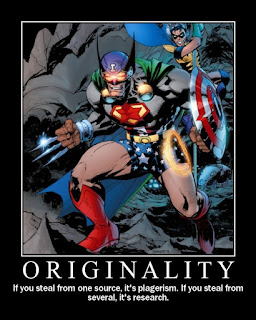Dominion review, for real this time!
 As promised, I have a review for this Dominion game written for those who are not already familiar with the game. The popular opinion here is that this game is ideally played with 3 or 4 players, but I've only ever had a chance for a 2-player game once. I cannot honestly say it's bad to go 2-players with this level of experience, particularly because I do enjoy personal games. The essential idea is that you have a deck of cards that is set a certain way, and you have to purchase more cards for the deck (game money, not real money) using the coins in your existing deck to improve it. More powerful cards are worth more money. The end goal is to purchase victory point cards which, for the most part, offer little to no value in assisting your gameplay.
As promised, I have a review for this Dominion game written for those who are not already familiar with the game. The popular opinion here is that this game is ideally played with 3 or 4 players, but I've only ever had a chance for a 2-player game once. I cannot honestly say it's bad to go 2-players with this level of experience, particularly because I do enjoy personal games. The essential idea is that you have a deck of cards that is set a certain way, and you have to purchase more cards for the deck (game money, not real money) using the coins in your existing deck to improve it. More powerful cards are worth more money. The end goal is to purchase victory point cards which, for the most part, offer little to no value in assisting your gameplay.For those who are familiar with collectible card games, this gives me an experience similar to drafting in that card pool valuation is incredibly important. Just as important though, is your ability to understand the pace of the game. Just as Chess has an opening, midgame, and endgame, so does Dominion, and it is the players' responsibility to adjust their strategy accordingly. The game ends when either 3 stacks of cards have been exhausted or the Province pile is exhausted (Province is the most valuable victory point card). Victory point cards are not usually good to grab until the game is closing, but if everyone is quickly grabbing the same cards, that can come rather quickly. You have to figure out your strategy (examples of which I have outlined in my previous article), figure out what cards will best help you work that way, and know when to adjust to the natural course of the game. Get into the wrong "gear" at the wrong time and you can pay very badly.
It's a worthwhile game to acquire, but it does have some flaws. For one, the random nature of the game can be irritating to some, but fortunately the designers have suggestions for set card pools for that audience. The biggest problem is actually the amount of time you spend shuffling your deck of cards. You'll run through the entire thing about a dozen times. This can easily hold up the game, especially if players run lots of card-drawing that exhausts your deck in the middle of your turn (you shuffle the discard back in every time you have to draw from an empty deck). Throw in slow, methodical players like myself and you could have a rather slow game to match.
One thing rather unique to this game is that there is not usually much interaction with the other players. Although there are cards which have effects to attack opponents, the focus is by far on your own development. This means very few opportunities for "dick moves," which I am very famous for performing. Personally though, I'd rather have people hate me for my aggressive play style than because my own turn has to take so long.
I do not believe this is a game you can just introduce to anybody. It definitely seems like a game for gamers by its nature, even though it's not really too complicated. It wouldn't be bad for a family game night, but only if your family can stand frequently shuffling their decks. I advise purchase for a game group that does not already have this, but beyond that, you should only buy it if you really feel you can spread it to another group. I don't see that being very likely.



Comments
Post a Comment
Comments are very welcome!